Some political people do lie all the time, and step over their friend to achieve the objective themselves. But I’m one who believes that one’s word of honor is about one of the most fundamentally important things there is.
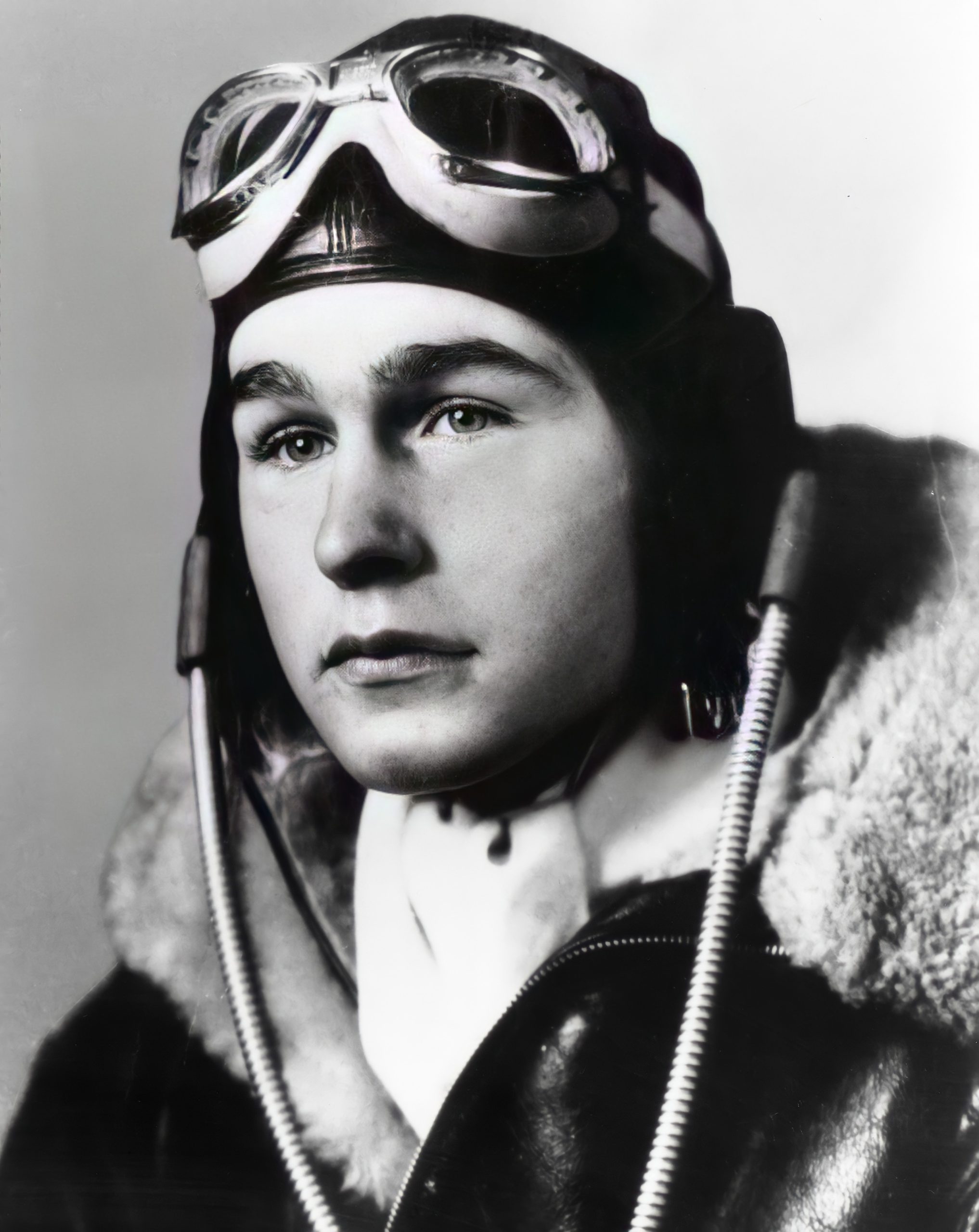
George Herbert Walker Bush was born in Milton, Massachusetts and raised in Greenwich, Connecticut, an affluent suburb of New York City. His father, Prescott Bush, was managing partner of the international investment banking house of Brown Brothers, Harriman and Company. The senior Bush later entered Republican politics and served as United States Senator from Connecticut from 1962 to 1972. In Greenwich, George Bush attended Greenwich Country Day School before entering Phillips Academy in Andover, Massachusetts. At Andover, he played varsity baseball, was captain of the basketball and soccer teams, and president of the senior class. When George Bush graduated from Andover, he had already been admitted to Yale University, but the United States had entered World War II, and he enlisted in the U.S. Navy Reserve instead. At age 18, he became the youngest pilot in the United States Navy. During the war, he was shot down in combat over the Pacific and earned the Distinguished Flying Cross.
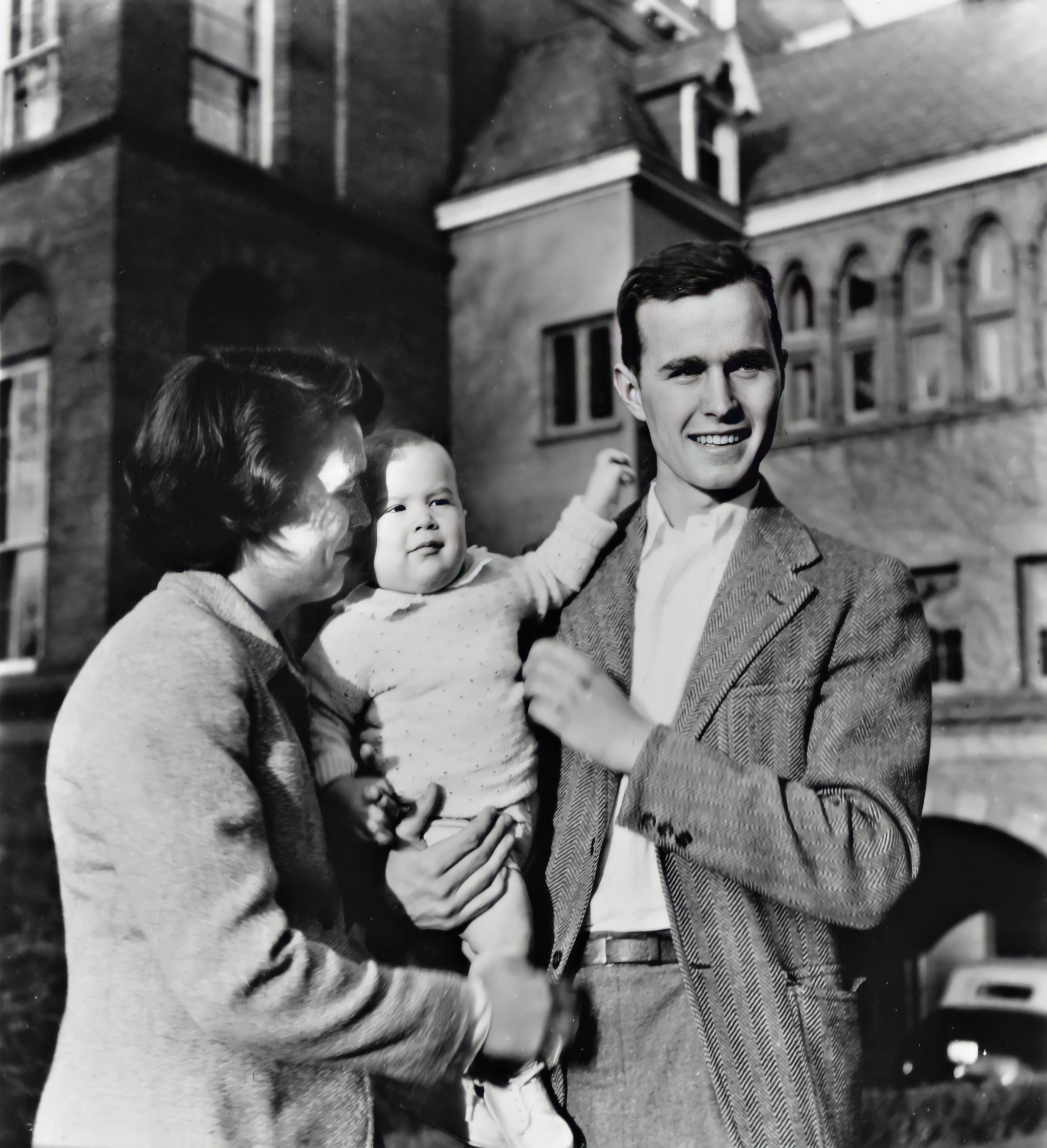
A few months before the end of the war, while on rotation home, he married Barbara Pierce, whose father published the magazines Redbook and McCall’s. After the war, Bush entered Yale, where in only three years he earned a B.A. in economics and a Phi Beta Kappa key. Although he was offered a job at his father’s firm, Brown Brothers, Harriman and Company, Bush moved, with his wife and infant son, to West Texas, where he worked for Dresser Industries, an oilfield supply company. He started at the bottom, sweeping warehouses and painting machinery, but soon became a salesman of drilling bits. By 1950, he had gone into business for himself, forming the Bush-Overbey Company with partner John Overbey in Midland, Texas. This company, which dealt in oil and gas properties, grew and took on more partners. In 1954, George Bush co-founded and became the president of Zapata Offshore Company.
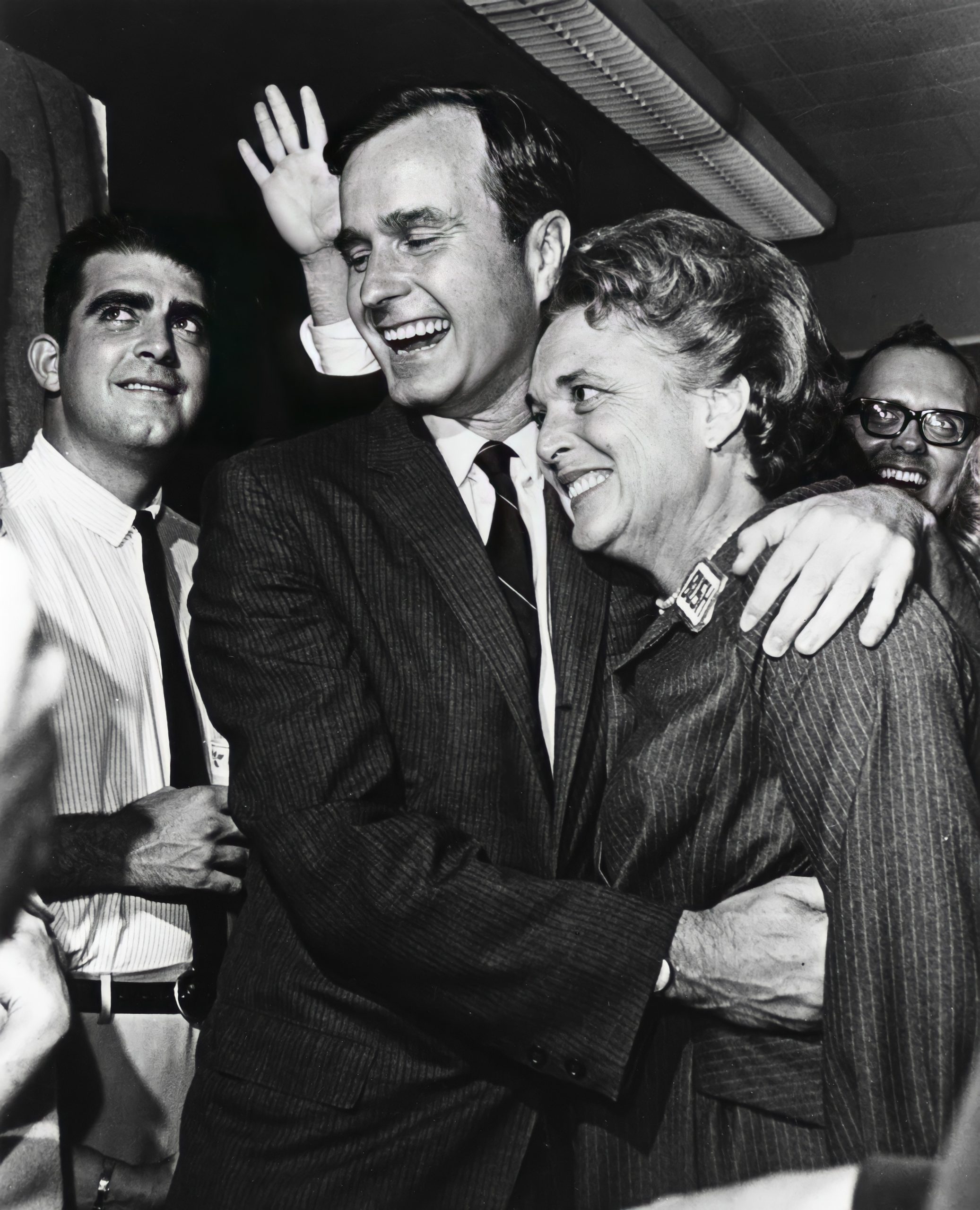
Having earned a fortune of his own, Bush became active in Republican Party politics. By 1964, he become chairman of the Republican Party of Harris County. That same year, he ran for the U.S. Senate, but was defeated in the Democratic landslide that returned Lyndon Johnson to the White House.
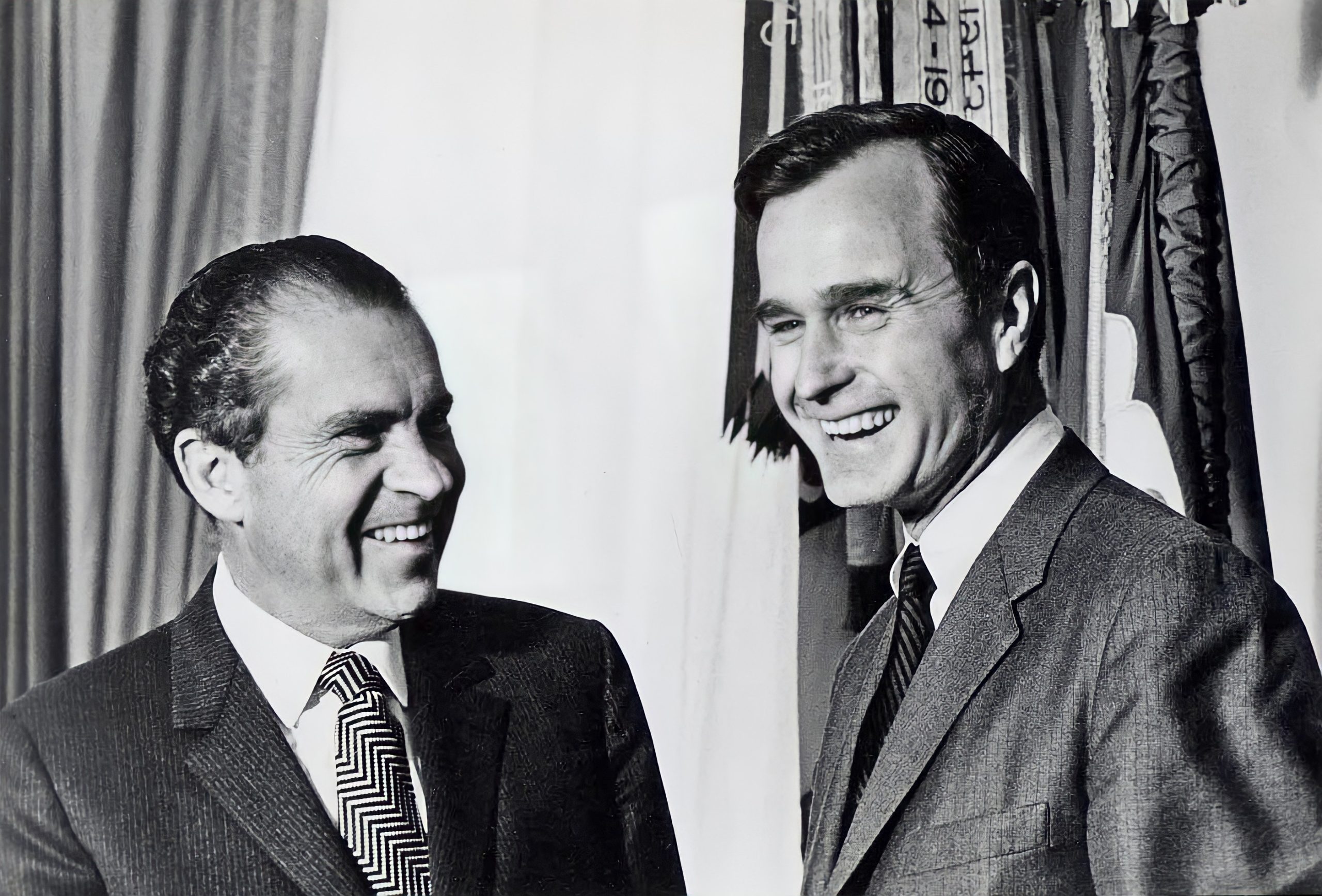
Bush had better luck in the election of 1966, when he became the first Republican ever to represent Houston in Congress. Bush was easily re-elected in 1968. By 1970 he was ready to try for the Senate again, but was defeated by Lloyd Bentsen.
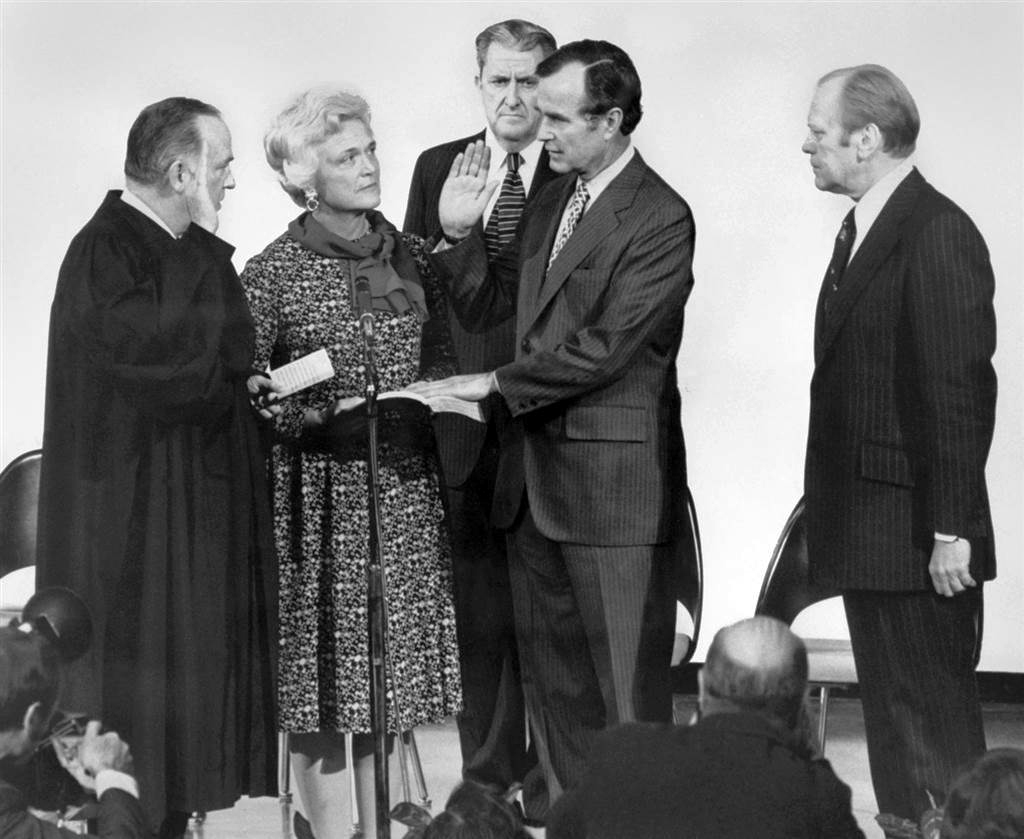
Presidents Nixon and Ford selected Bush for a series of high-profile appointments: Ambassador to the United Nations in 1971, Chairman of the Republican National Committee in 1973, envoy to China in 1974 and Director of Central Intelligence in 1976. When Jimmy Carter was elected President in 1976, he appointed a new Director and George Bush returned to private life.
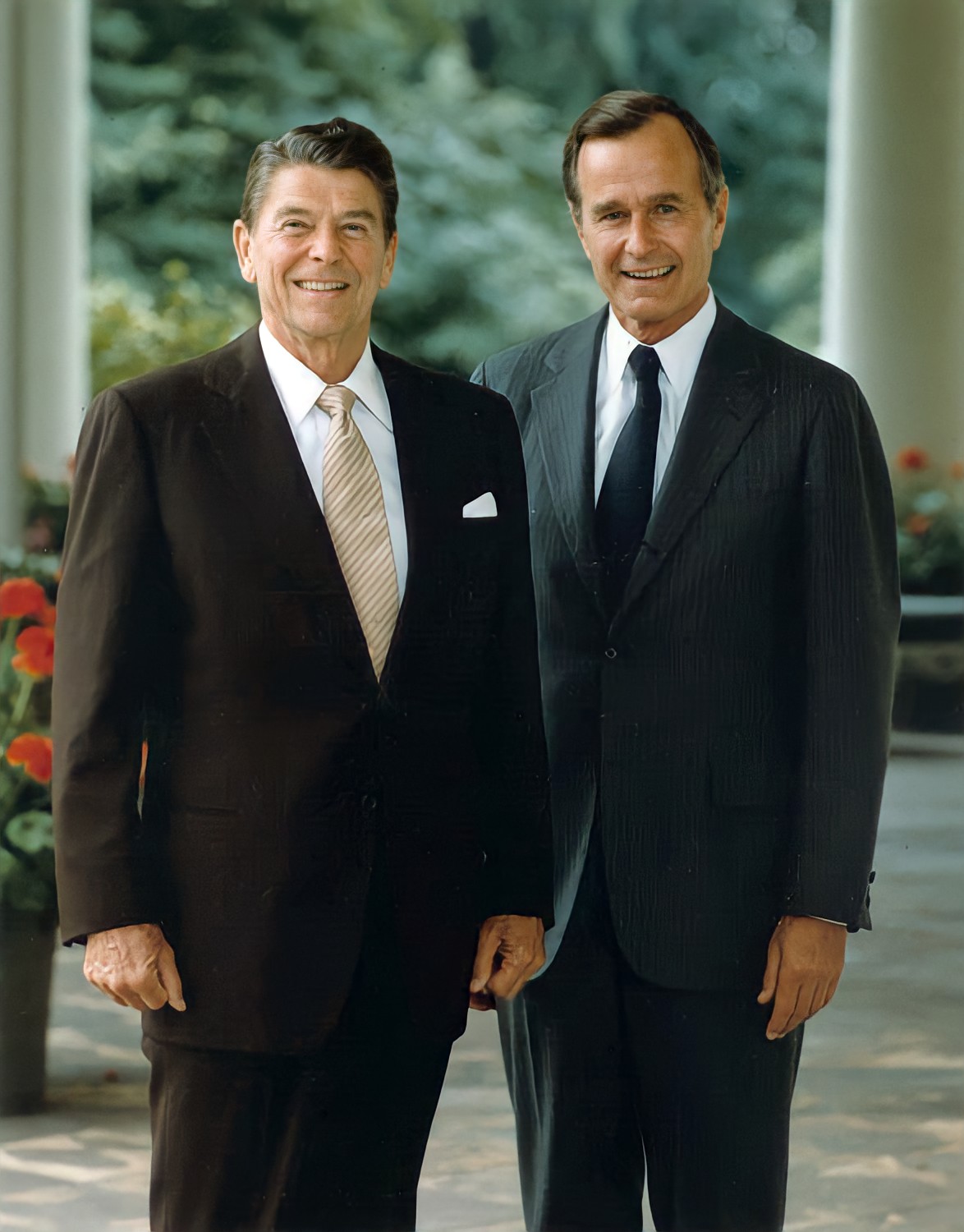
In 1980, Bush made his own run for the presidency. In early primaries that year, George Bush made a strong showing, but by the time the Republicans met for their convention in Detroit, it was clear that Ronald Reagan would be the nominee, and George Bush had dropped out of the race. Many Republicans were surprised when Reagan selected Bush as his running mate. At the time, they were considered leaders of opposite wings of the Party, Reagan a conservative and Bush a moderate, but Bush campaigned effectively for the ticket. The pair won handily and were re-elected by a landslide in 1984.
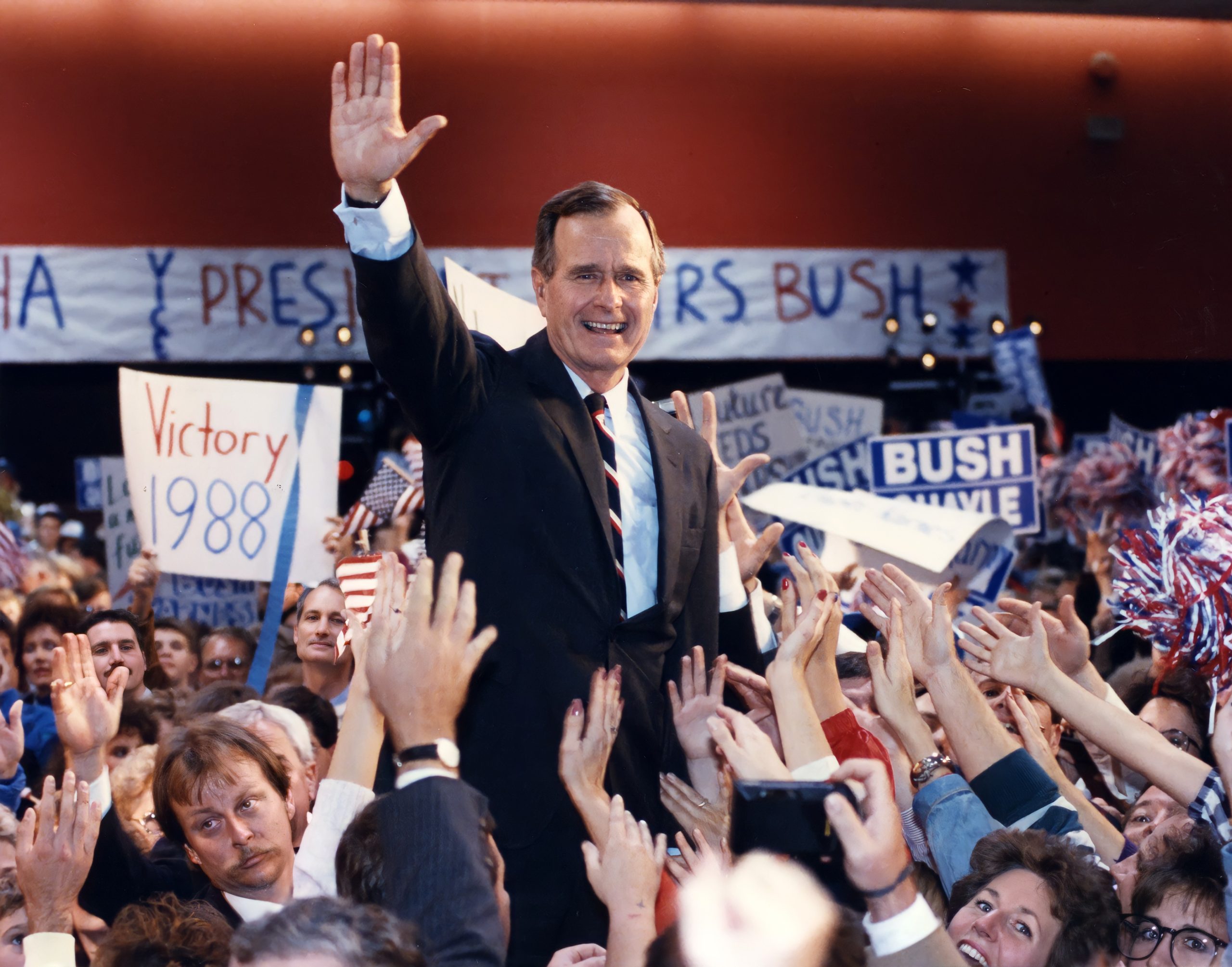
George Bush sought the presidency again in 1988, and won the Republican nomination over a large field of candidates. His election that November was a decisive one, though not the landslide he and Reagan had enjoyed in 1984.
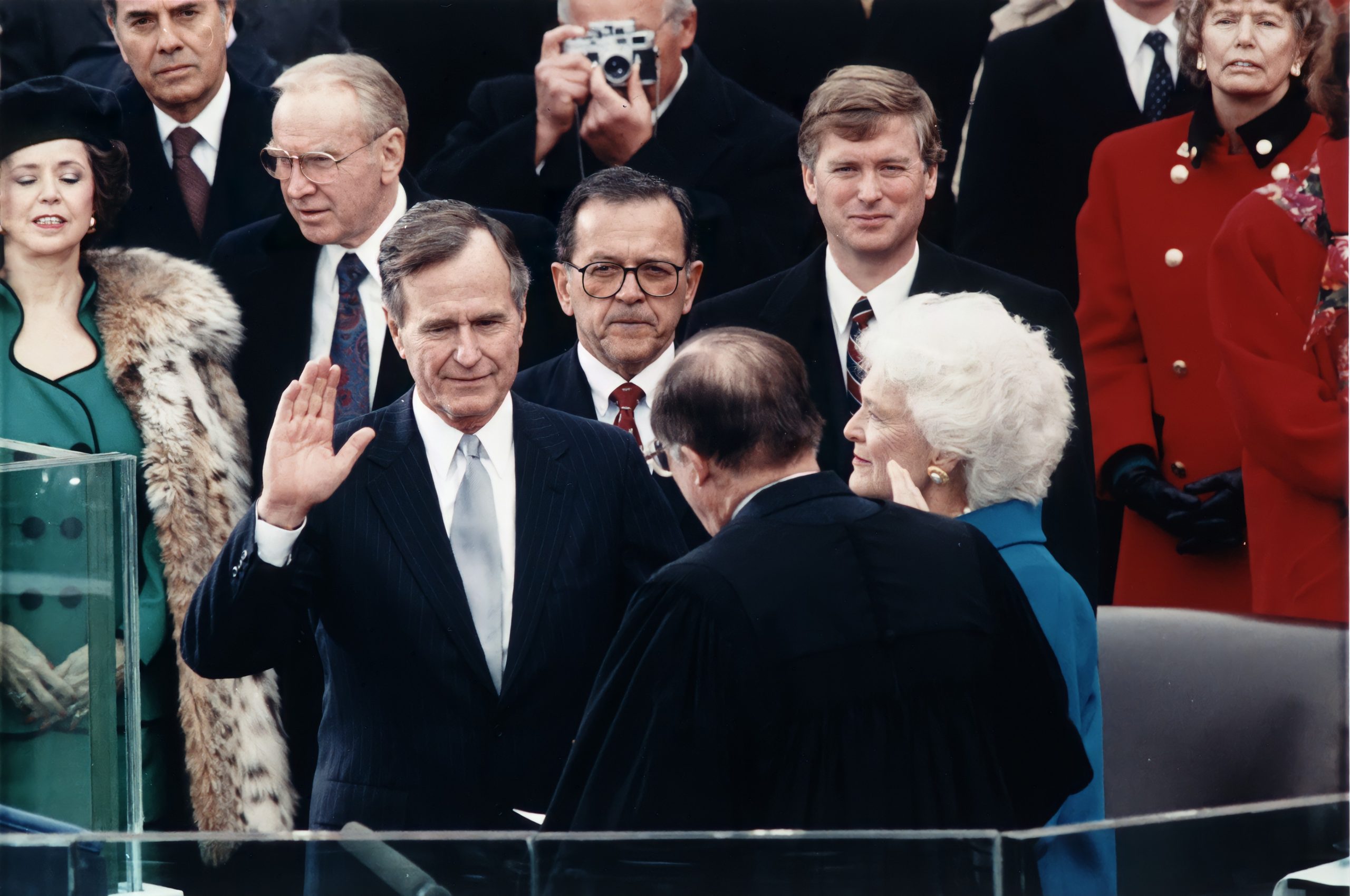
The two proudest accomplishments of Bush’s presidency were the passage of the landmark Americans with Disabilities Act (the ADA) and the successful prosecution of the war to liberate Kuwait from Iraqi occupation. This effort saw the U.S. leading a grand coalition, including Arab countries which had long distrusted the United States. This experience of cooperation led to a renewal of the stalled Mideast peace process.
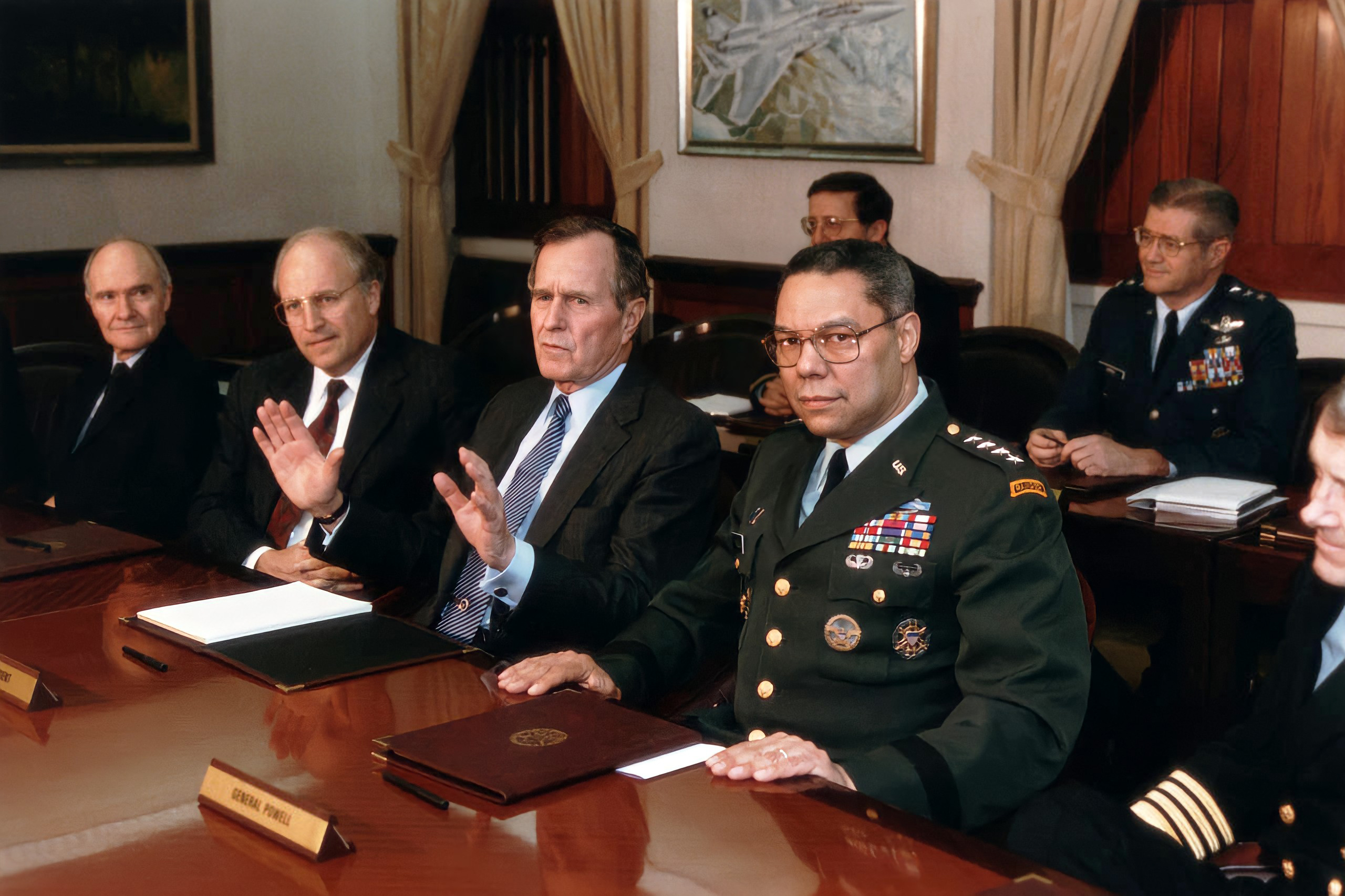
A sluggish economy undermined President Bush’s chances for re-election in 1992. The third-party candidacy of businessman H. Ross Perot, Jr. split off a fragment of the Reagan-Bush electoral coalition, and President Bush was defeated by the Democratic candidate, Arkansas Governor Bill Clinton. After leaving office, George Bush avoided criticizing his successor, and lent his support to the controversial North American Free Trade Agreement, which was initially drafted during his own administration.
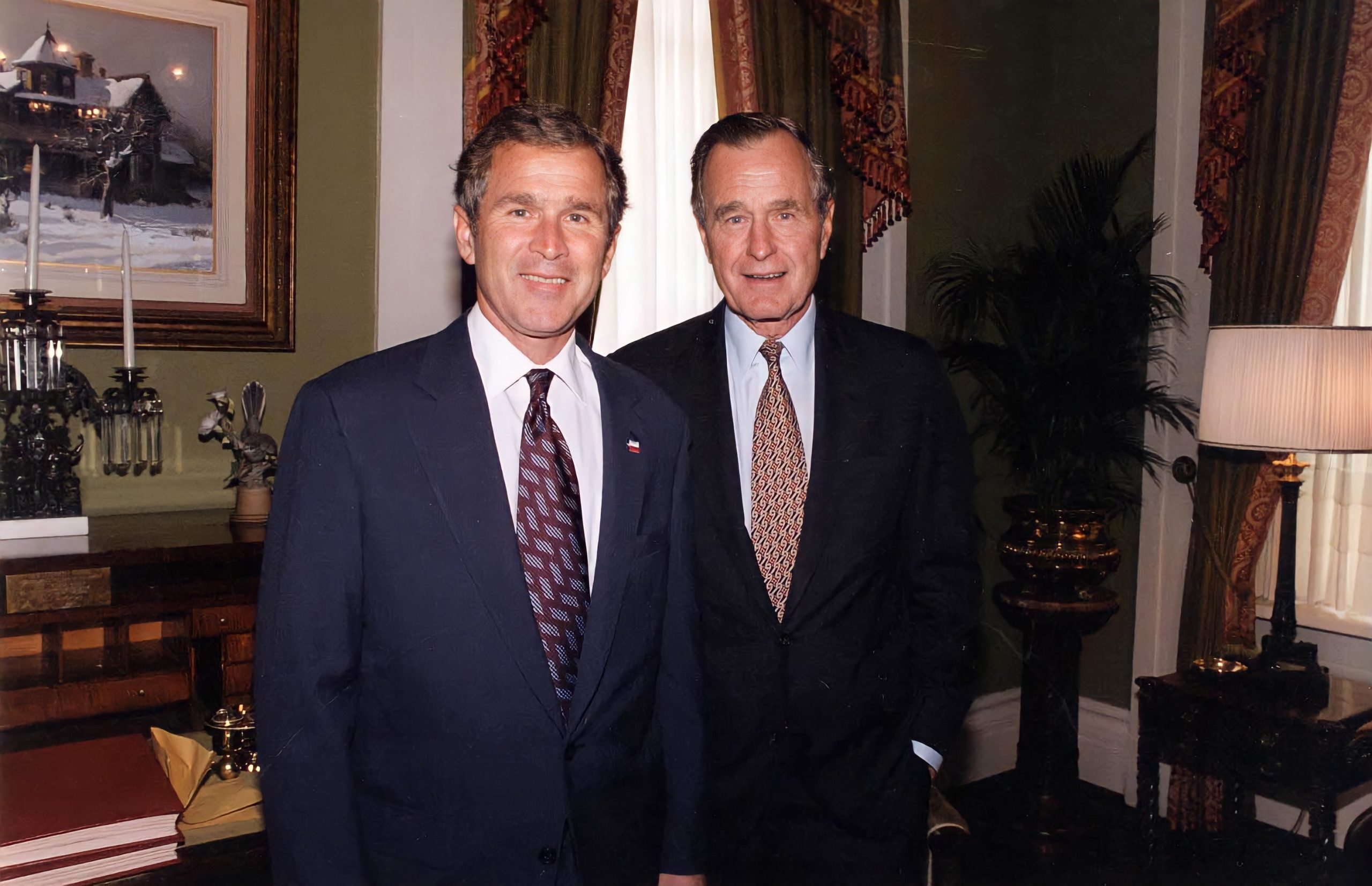
After being defeated for re-election in 1992, George Bush had the pleasure of seeing two of his sons achieve high office. George W. Bush was elected Governor of Texas in 1994, and Jeb Bush won election as Governor of Florida in 1998, but the political achievements of the Bush family did not end there. Only once before in U.S. history had the son of a former U.S. president succeeded to the presidency. The second President of the United States, John Adams, was not well enough to travel to Washington for his son John Quincy Adams’s inauguration in 1825. But in 2001, former President George H. W. Bush was still in vigorous good health, and sat proudly by as his son George W. Bush was sworn in as 43rd President of the United States.
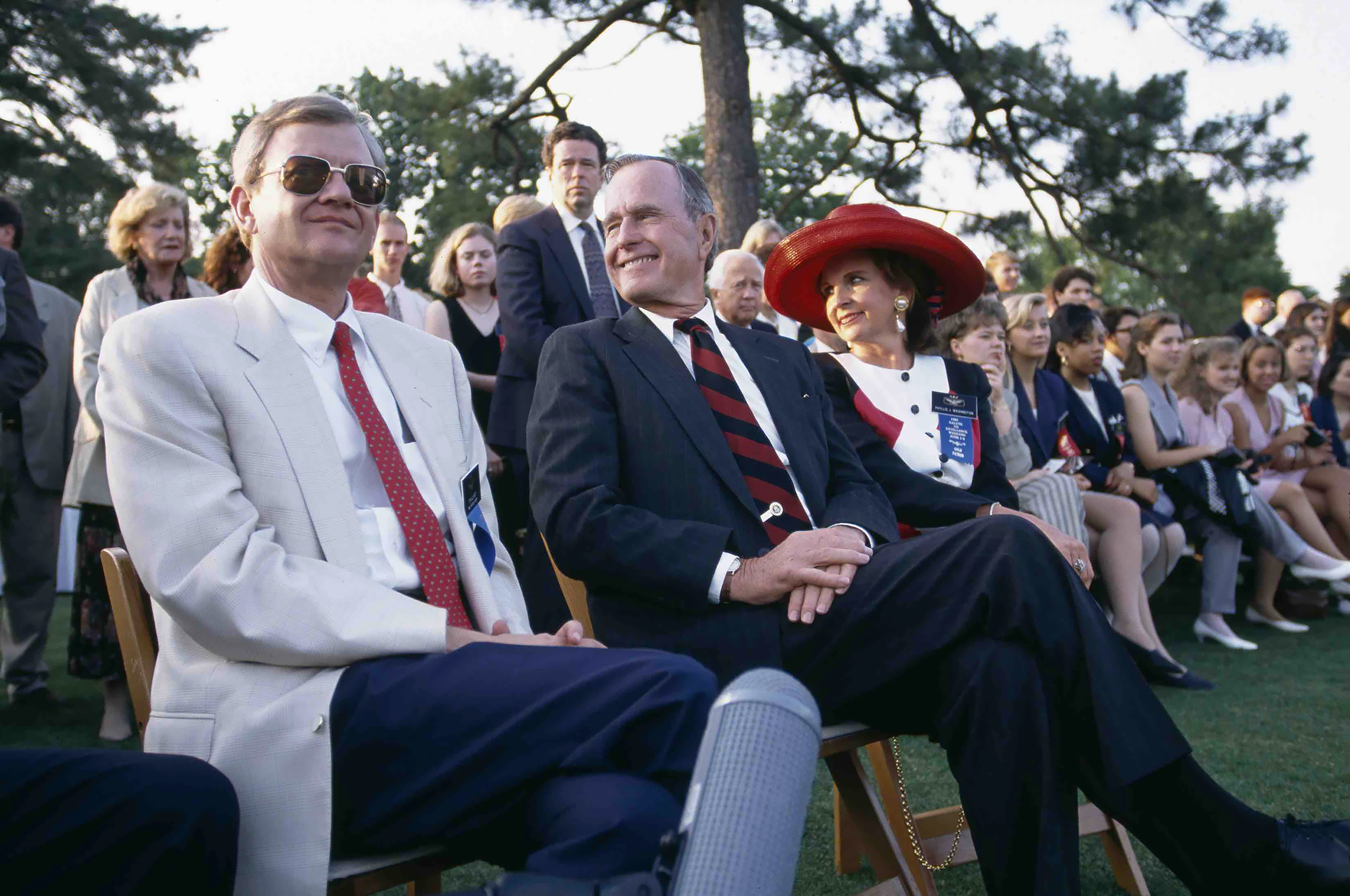
The elder President Bush surprised almost everyone when he fulfilled an old ambition and parachuted from an airplane for the first time since his wartime service. He was 72 years old at the time, and repeated the feat to celebrate his 75th, 80th, 85th and 90th birthdays. On his 80th birthday, he parachuted — not once, but twice — onto the grounds of his presidential library.
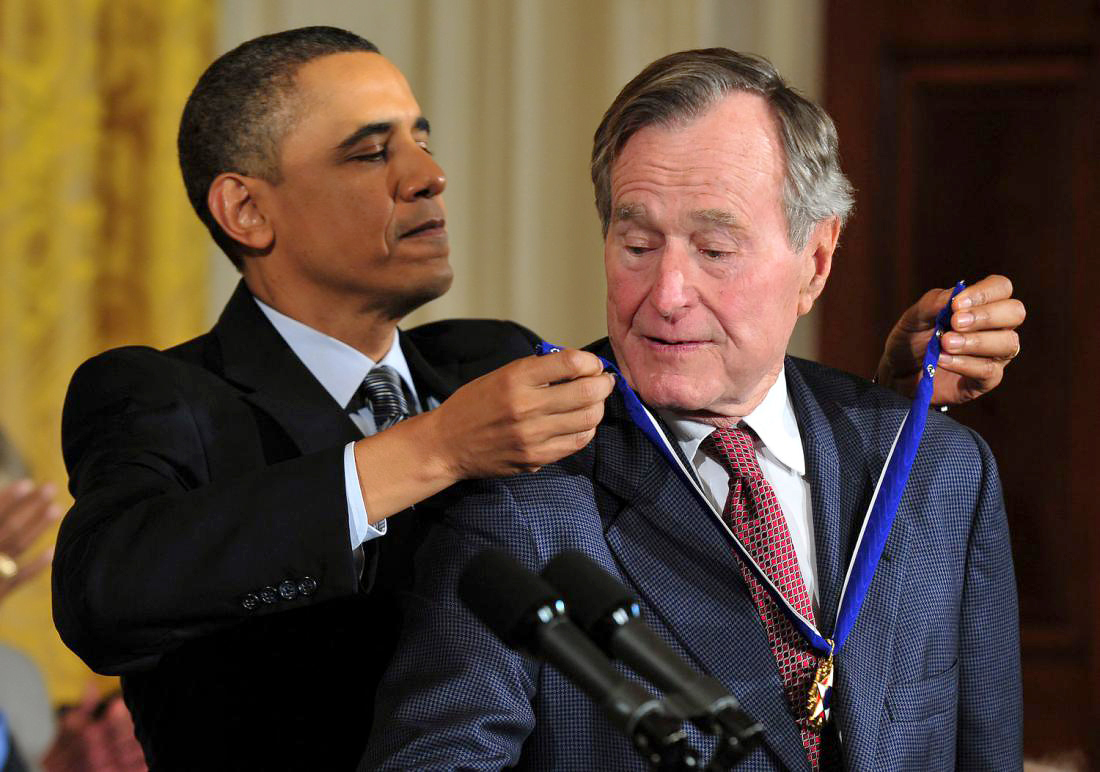
During his son’s presidency, George H. W. Bush forged a highly visible partnership with a one-time political rival, former President Clinton, joining forces to mobilize international support for disaster relief after the 2005 tsunami in Indonesia. In 2011, President Barack Obama recognized George Herbert Walker Bush’s lifetime of service, awarding him the Presidential Medal of Freedom, the nation’s highest civilian honor, in a ceremony at the White House.
At the time of his death at age 94, he was the oldest ex-president in American history. His passing was noted with the praise of leaders from around the world and from both sides of his country’s political divide. The historical reputation of George H.W. Bush’s presidency has grown with the years, and the man himself is remembered as an exemplar of courtesy and integrity in public life.

“This aggression will not stand.”
With these words, George Herbert Walker Bush committed the United States to the liberation of the oil-rich Kingdom of Kuwait, after it had been occupied by the Republic of Iraq in August of 1990. Over considerable opposition, Bush rallied the country to the cause, and assembled an unprecedented international coalition.
George H. W. Bush devoted his life to his family and to his country. He enlisted in the Naval Reserve and flew combat missions in World War II while still a teenager. After enjoying success in business, and raising his family, he entered political life, serving as Congressman, Vice President and finally President of the United States.
His administration saw the passage of the Americans with Disabilities Act, renewal of the Voting Rights Act, and successful American military actions in Kuwait and Panama. Over the course of his career, he involved himself in many of the most contentious political debates of the age, but through it all he retained the personal goodwill of political allies and adversaries alike.
Was there an experience that changed your life?
George H.W. Bush: I think the major event that shaped my life was being a naval aviator. I got my commission and wings at 18 years old, and then I went into combat at 19. And I think, as I look back on it, that whole experience probably shaped my life more than any incident, or any event. Although I remember when I was shot down in that war. I remember how terrified I was. And it made me feel close to my family, and to God, and to life, and I was scared. Then we lost a child, there was that incident, a four-year-old little girl. It had a profound effect on me and on Barbara. You know, when you lose a child some families go apart. There’s a common wisdom that the loss of a loved one for parents divides them later on. People cite divorce statistics. In our case it was just the other way around. And our family has been close, close, close. And Barbara and I have been married for over 50 years, and I think that horrible incident drew us even closer together.

How do you define integrity?
George H.W. Bush: The word integrity to me means being honest. It means that your word is good for something. I was in business years ago out in West Texas in the late ’40s and early ’50s. You didn’t need escrow agreements and 25 lawyers. Your word was your bond. You shook hands with a person and the deal was kept, it was made. Nobody would run away from a handshake. Integrity is having your word of honor so sacrosanct that others trust you.
Is there integrity in world politics today?
George H.W. Bush: Much more than you’d believe from the current wisdom: that everybody in politics is selfish, everybody is in there to glorify himself, or herself, that all politicians are corrupt.
I’m disturbed by the attack on political figures. The assumption that everyone is guilty until proven innocent is just 180 degrees different than the justice system ought to be. And I don’t know what it takes to change that. I think the attacks that hurt me the most were not those that differed with me on abortion, or guns, or prayer in school, or on balanced budgets, or on taxes. The ones that hurt the most were those that challenged my character. Didn’t trust my word. And I think there’s an adversarial feeling in the press that “All politicians are going to lie to me, and therefore it’s my obligation to get to the truth.” It’s a very unhealthy view. And some political people do lie all the time, and step over their friend to achieve the objective themselves. But I’m one who believes that one’s word of honor is about one of the most fundamentally important things there is.

What was the proudest moment of your career?
George H.W. Bush: This may sound like a cliché, but I’ll put it this way. The proudest thing in my life is that my children came home. The proudest moment of my presidency, domestically, was when I signed a piece of civil rights legislation known as the ADA, doing something for the disabled. A massive piece of civil rights legislation that put disabled people, 50 million of them, into the mainstream, or at least removed legal obstacles to their being in the mainstream. The proudest moment internationally was when we prevailed over a brutal dictator. Formed a coalition that overcame public opinion in this country, cynicism in the press, reluctance in the Congress to do what was right, to say that a country — in this instance, Iraq — with the fourth largest army in the world, was not going to brutalize its neighbor, take over its neighbor by force. It was proud for me because I was privileged to be the commander-in-chief, but I’m not quite egotistical enough to feel that it was anything but a team effort. A classic victory of young soldiers working together, of sound diplomats doing their best. And of a country coming together to make a profound moral statement: aggression will not stand.

What were the biggest disappointments in your career?
George H.W. Bush: Nobody likes to lose. I used to call home when I was a 14-year-old soccer player away at school and tell my mother, “I got three goals today.” And she’d shake me off over the long distance phone and say, “It doesn’t matter, how did the team do?” When I lost a race for the United States Senate, I thought the world was going to end for me politically, and 18 years later I was elected President of the United States. The biggest disappointment was that I wasn’t able to communicate properly to the American people — with the proper conviction and the proper ability — where the country really stood. The pessimists, the naysayers, the change-wanters overwhelmed me, and I wasn’t good enough. I wasn’t articulate enough to have the country understand that we weren’t in a recession, that we were in a rather booming economy in the last half of my presidency. That was a personal shortcoming, a failure on my path. My predecessor could handle it pretty well, Ronald Reagan.

I don’t want to put a bitter note on the press, but there’s an unaccountability. The charge that got me the most was against my character. It was alleged that I went to Paris to meet with Iranians in 1988, to talk them into holding Americans hostage until after the presidential election. I fought for my country. The fact that this charge could be given credence by the press got right to my soul. The fact that it caused the Congress to spend $2 million running down this outrageous charge against my very soul really, really affected me. It still does, and it will ’til the day I die. I fought for my country, and to suggest that I would make an insidious deal like that with the Iranians so that Ronald Reagan and I could win an election was horrible. I fault the press for that. I fault them for unaccountable charges that were subsequently shown to be totally false. I fought the Congress from pursuing this outrageous allegation against my character. Good friends on the Democratic side insisted on the hearing. In a sense, I’m glad they did, because there was total vindication and these charges were shown to be totally erroneous.

I went to a Missing In Action POW meeting just before the election. Some idiot got up and started yelling at me that I knew there were live Americans in Vietnam, and I was unwilling to bring them home. That had nothing to do with Vietnam prisoners. What it had to do with was character. Would an American president, would I, who fought for my country and did my level best, leave an American incarcerated, knowing that we could do something about it? And the answer was, no. It’s the attack on character, it’s the attack on your very fiber, your being, that hurts. And who’s guilty? Well, I think to some degree the press is much more unaccountable and ferociously adversarial. And I think there’s some that have accepted the view that, well, this might well be true, the man doesn’t have the character. And I did. I made mistakes, screwed things up real bad on a lot of things. Couldn’t get things done the way I wanted, but it wasn’t because I was a couple of quarts low on character.

All public figures are subject to criticism attacks. How do you respond to attacks?
George H.W. Bush: If you’re attacked personally you have to basically ignore it. You’ve got to go back in history and recognize that there’s nothing new here. It’s more vindictive, more outrageous, more unaccountable. The way that Franklin Roosevelt was treated in the presidency by the press is entirely different than the way President Clinton, or me, or President Reagan were treated. There’s been an evolution of incivility. But that isn’t to say that there weren’t, in our history, ferociously nasty editorials and charges and counter-charges that weren’t true. You have to have a relatively thick skin, you’ve got to turn the other cheek. You’ve got to try to do what your little kids in high schools do, make friends, and go the extra mile to see that the critic knows where you’re coming from. But it can be ugly. There’s a pack mentality today. And one hound gets out in front and the rest of the pack are baying at the heels of whoever it is that’s being pursued. That’s not a good thing. And so, what do you do when you’re under fire? Try to tell the truth. Try to give it your best shot. Don’t take it too personally, and get on with your life.
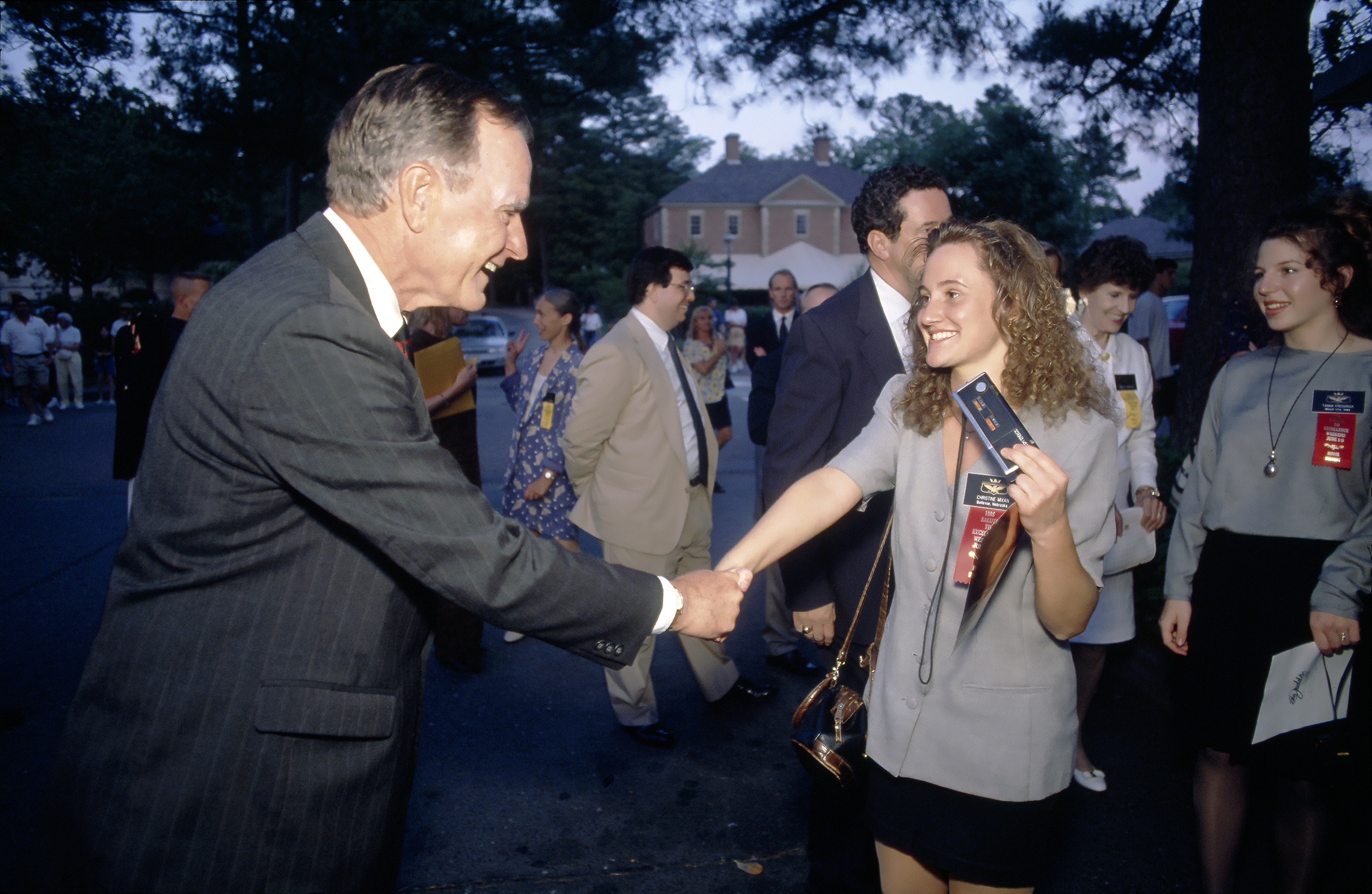
Some people say that President Roosevelt allowed the Japanese to attack Pearl Harbor.
George H.W. Bush: I think that’s absurd. I don’t believe it for a minute, that he would have on his conscience the death of those people, and the battleship that you can see today, some bodies still in it, out there at Pearl Harbor, that he would have that guilt on his hands. I don’t believe it for a minute. I think there have been cases in history where the disclosure of information would cost more lives than the price for not disclosing. I think Commanders-in-Chief face dilemmas, but I don’t think Roosevelt would ever be guilty of permitting a Pearl Harbor, so as he could mobilize public opinion to bring the United States into the war on the side of our allies against fascism, and on the side of our allies against imperialism. An allegation can be made against a public figure, or a private figure, or a neighbor. Say it once loudly and get enough coverage, or spread enough disinformation, and the person can be severely damaged.
I’ll give you a personal example. It was alleged that I was out of touch. “Bush is a president that’s out of touch. He came from a privileged background, doesn’t understand the hurt around this country.” I went down to see a technology show, and one of the items in the show was a brand new technology for check-out counters. It showed a machine that had never been invented before and, if my recollection is correct, wasn’t even on the market at this point. The guy brought in a crumpled milk carton and ran it across this scanner and it did something that no other scanner could possibly do. I made some comment. “Amazing, this is a wonderful thing.” And the people that produced this were saying, “This is the state-of-the-art, and we’ve got more to come.” It was wonderful. A lazy little journalist with a famous name working for The New York Times, the son of a decent and honorable father, but a lazy little journalist, was sitting in another room. He didn’t see this. He wrote that, “Here is Bush, he’s out of touch. He saw a scanner. He didn’t even know that at supermarkets you can scan something.” It played right into the hands of the press that wanted to show I was out of touch and it was picked up. We pointed out to the press afterwards that, one, the guy wasn’t there; two, this was brand new technology. CBS, not my favorite, came and defended me. Another one of the wire service reporters said that I got a bum rap, but the people don’t remember that. What they remember is that I was out of touch, that I didn’t even know what a grocery scanner was. You can’t fight back against that kind of thing. You can do a better job in communicating. I plead guilty to not being the world’s greatest communicator. But that was a myth, that was a lie, that was bad for me. And yet it lives on, people remember it. The fact that Bush was out of touch, he didn’t even know there was a grocery counter scanner. Now, what’s the equity, what’s the fairness in that kind of reporting, that kind of cynical attack? But the answer is, you can’t let them get you down, you’ve got to keep on trying to do your best.
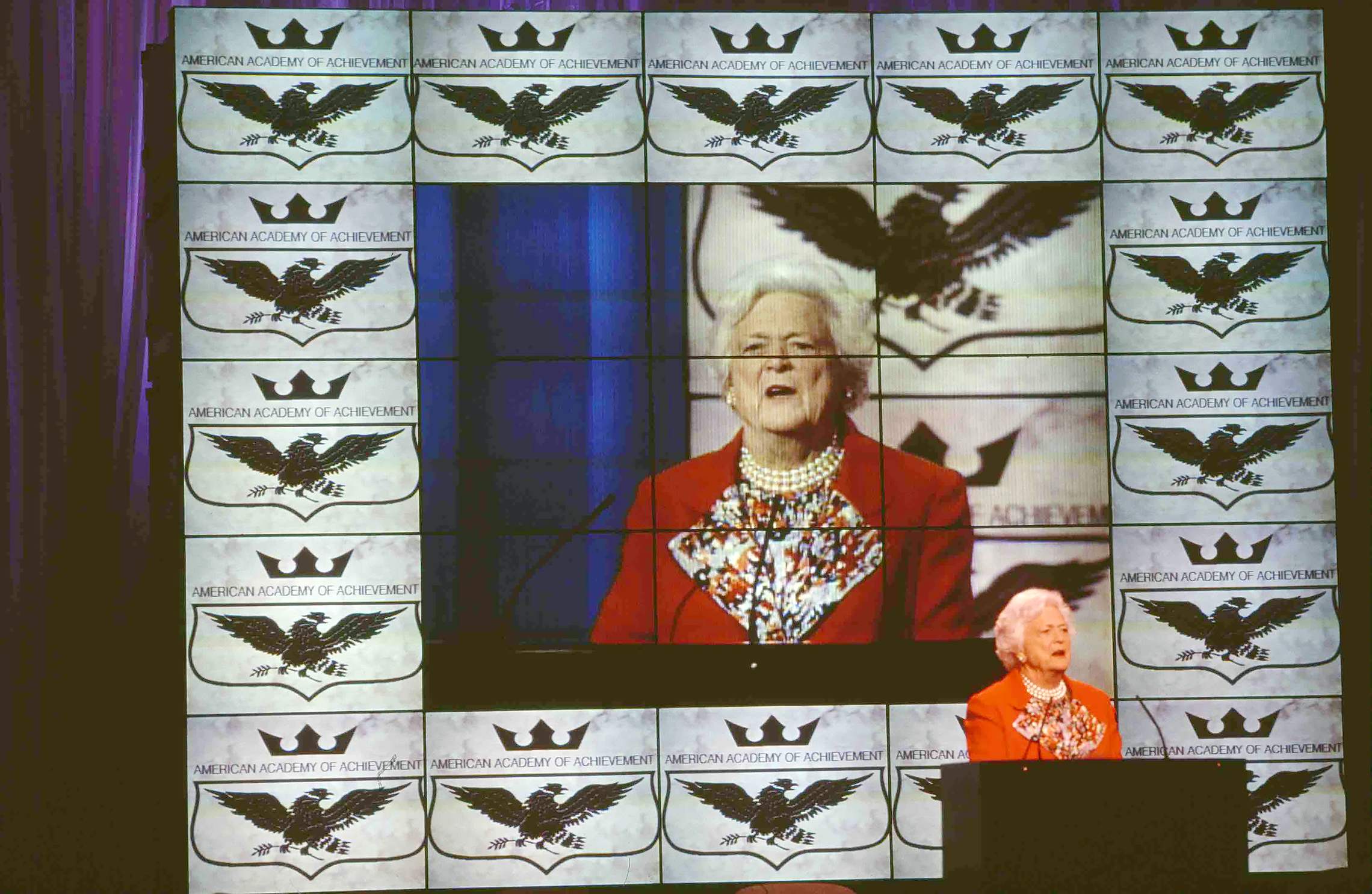
It gets back to what my mother said, “Do your best, try your hardest, be honest.” Those high achieving kids — I hope they’re listening to that advice. Because if they get to be president, if they get to win the Nobel Peace Prize, it’s those kind of values that are going to matter.

